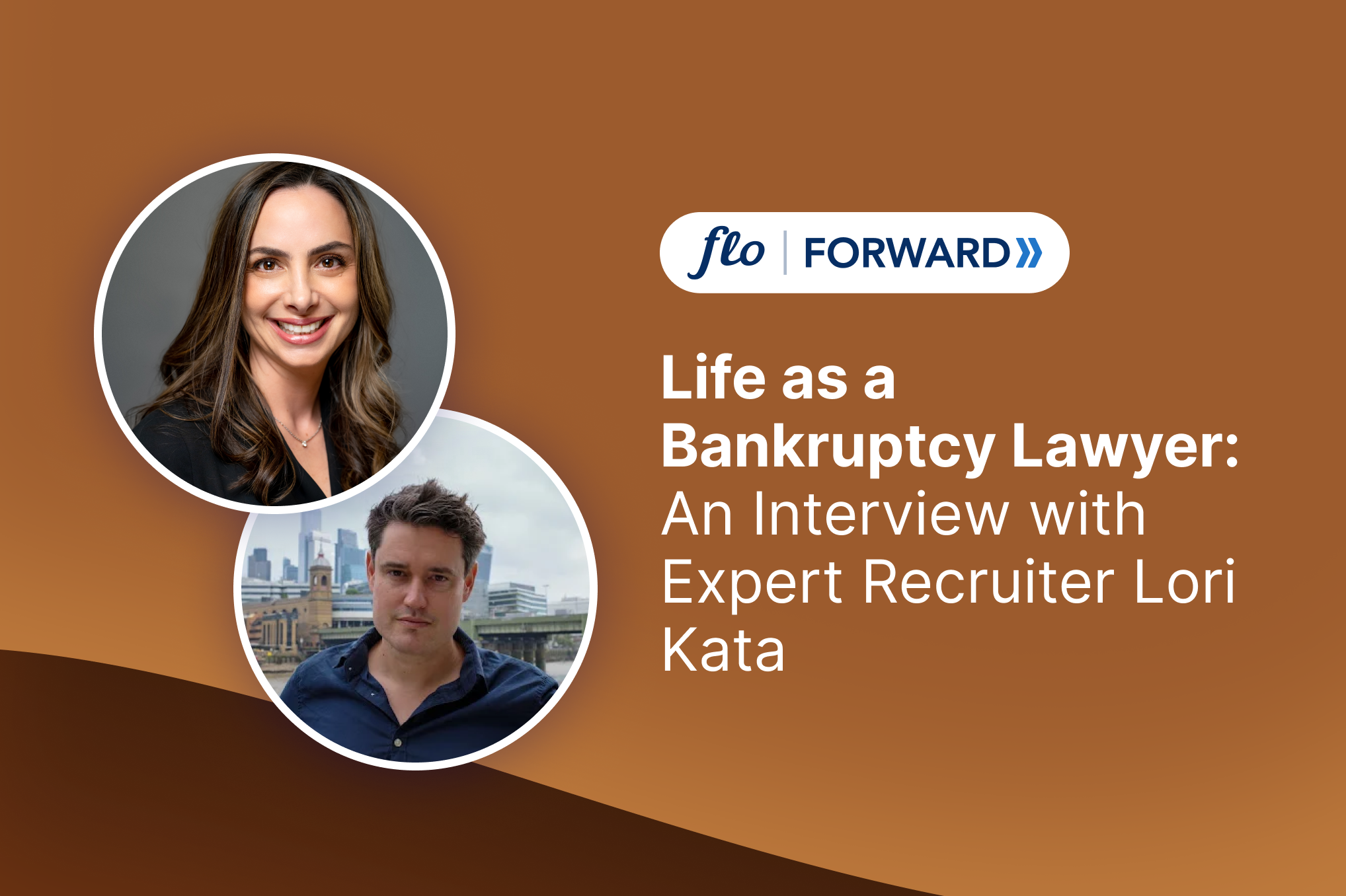As a bankruptcy attorney, “you’re using both deal-making and litigation skills to build consensus among many competing interests,” reveals Lori Kata of Momentum Search Group. Once a bankruptcy attorney herself, she’s now a market-leading bankruptcy recruiter. We spoke to Lori about what drives a bankruptcy lawyer and how to plan a career in this fascinating area.

Antony: Could you give us an idea of what the bankruptcy market looks like at the moment?
Lori: Right now, bankruptcy is incredibly active. Whenever there’s instability in the broader economy, bankruptcy lawyers tend to be busy. Sometimes it’s industry-specific — a sector experiencing economic turmoil might generate a wave of filings. That was the case with retail and oil and gas a few years ago. There are still a lot of legacy asbestos cases, too.
We also see a spike in associate hiring when prominent groups or high-profile partners make moves, like Ray Schrock’s recent move from Weil to Latham.
One trend that ties back to the pandemic: during any major economic shift — like a recession — the large firms ramp up hiring first. Firms like Milbank and Latham bulk up quickly to handle the workload. Then, once things settle a bit, smaller firms pick up the work relating to the fallout of a major corporate bankruptcy. In a major Chapter 11 case, you might see Kirkland or Weil representing the debtor, and then smaller firms will represent other parties — for example, leaseholders or vendors owed money.
Antony: Typically, when might a lawyer specialize in bankruptcy?
Lori: In BigLaw, many lawyers specialize right off the bat. If you took a bankruptcy or secured transactions class in law school — or if you’re looking for a hybrid practice that mixes litigation and transactional work — then you might gravitate toward a bankruptcy group as a summer associate.
Some graduates go straight into a bankruptcy clerkship, especially in jurisdictions like New York or Delaware, where those opportunities are slightly more accessible than other federal clerkships.
It's harder to make a switch into bankruptcy once you're already in BigLaw, so most people end up specializing early. Corporate associates often get the chance to rotate between groups, but that’s not usually the case in bankruptcy. You very rarely see people retool into this practice. There are exceptions — Capital Markets is countercyclical, so you might pull people from that — but it's uncommon.
Antony: Where do lawyers typically come from before they specialize in bankruptcy?
Lori: Many come directly from bankruptcy clerkships, especially in New York, Delaware, and Texas. Also, New York–based law schools — like Brooklyn, NYU, and St. John’s — offer bankruptcy-related classes often taught by top practitioners. St. John’s even offers a specialized LLM in bankruptcy.
These classes can be incredibly effective in getting students excited about the practice. In general, it’s quite common to see associates in New York coming from local law schools. While BigLaw tends to favor the traditional "T14" schools, bankruptcy is more open — there’s definitely a strong presence of local and regional law school grads, and those schools do a great job of preparing students for the field.
Antony: With the different kinds of bankruptcy practices out there, what can that mean for your career? Does this differ by location, law firm type, or client type (creditor, debtor, etc.)?
Lori: This is something many associates think about early in their careers. The top debtor-side practices — like Weil and Kirkland — tend to attract associates who are committed to building a career in bankruptcy. Those firms often have large first-year classes coming straight out of summer programs.
Some of those associates may be aiming for partnership, but others are thinking about going in-house. On the debtor side, you get great generalist experience — but if you're targeting a move in-house to a distressed hedge fund or a bank's distressed desk, then you’ll likely need bondholder-side experience. You find that at firms like Paul Hastings, Gibson, Akin, and Milbank, which are more creditor-focused.
Antony: What does a bankruptcy case look like for a law firm? What work do the associates and partners do?
Lori: It really depends on whether the firm focuses on debtor-side or creditor-side work.
At big debtor-side shops like Paul Weiss, Kirkland, or Weil, associates typically work on “first-day pleadings” — these are the initial motions a company files on day one of a Chapter 11 case. They might ask the court for permission to pay key employees to ensure retention, pay professionals like lawyers and financial advisors, or pay critical vendors to keep operations going.
Debtor-side practice also involves a lot of litigation — disputes with creditors over payment terms in the reorganization plan, or whether certain creditors can leapfrog others under DIP financing terms.
On the creditor side, you’ve got firms like MoFo and Kramer Levin doing committee work, or Milbank, Gibson, and Paul Hastings working for bondholder groups. Associates there do more transactional work — reviewing indentures, analyzing capital structures, and working on DIP or exit financing agreements.
Antony: What kinds of skills are needed to thrive in bankruptcy?
Lori: A bankruptcy attorney needs to be both commercial and creative. The goal is to get a deal done and help a company emerge from bankruptcy with creditor support — and that often requires a lot of compromise. Deals frequently come together on the courthouse steps.
It’s a fast-paced practice, so time management is critical. You also need strong writing skills because litigation is such a big part of the job.
This is a true hybrid between corporate and litigation. If you're someone who enjoys both, this is a great fit. It also appeals to people who enjoy code-based, highly structured areas of law — it’s a very intellectually stimulating practice.
Antony: What makes it an exciting and rewarding place to work?
Lori: Bankruptcy is sometimes referred to as the Wild West — you’re using both deal-making and litigation skills to build consensus among many competing interests. That’s what makes it so challenging and rewarding.
It’s also a tight-knit community. Everyone knows everyone, and even when litigations get intense, there’s a lot of mutual respect within the bankruptcy bar.
If you loved the academic side of law school, this practice is for you. You can become both a specialist and a generalist. The work touches on litigation, finance, M&A (especially asset sales), securities, governance, and real estate. It’s an incredibly broad and varied practice.
Antony: What makes it a challenging place to work?
Lori: It moves fast — there are tight deadlines and many stakeholders, and the goal is always to move efficiently so that a company can reorganize and resume operations.
Some people love the hybrid nature of the practice, but others realize they’d rather focus on either transactional or litigation work. That’s often when people pivot out.
You’re often dealing with multiple constituencies that don’t agree with one another, so you have to recognize that compromise is essential. Bankruptcy can be loud — lots of strong opinions. The people who succeed tend to stay calm, patient, and respectful. You can’t make everyone happy. This isn’t a typical two-party litigation or deal — it’s much noisier and more complex. It’s not for everyone but very rewarding for the right type of attorney.
Antony: What might a career look like for a junior associate in bankruptcy? What’s the path to partnership? What about in-house or government options?
Lori: The average time to partnership in BigLaw is about 8–10 years. Making partner in a bankruptcy group depends on the firm’s business case — in a down market, the demand is there, but you still need buy-in from firm leadership.
In-house roles are competitive but growing — particularly at distressed funds and the distressed desks of major financial institutions.
Some associates end up lateraling to related areas — like bankruptcy litigation, which is a strong practice at Akin Gump or boutiques like Glenn Agre. Others move toward the transactional side. Special situations groups are growing and often work with hedge funds to delay or prevent bankruptcy through complex liability management transactions. For associates who enjoy the transactional aspect, that’s a natural pivot.
Antony: How do you help associates prepare for applications and interviews?
Lori: I always advise associates to be ready to talk about their work in detail — whether it’s a recent case or deal, you should be able to explain your role, the legal issues, and your contribution. Demonstrating substantive knowledge and genuine interest in the practice is key.
A strong résumé reflects that too — it should list specific skills and experience, not just vague summaries. That gives hiring managers a clearer sense of what you bring to the table.
Antony: What advice do you offer at Momentum to help attorneys find the right role?
Lori: At Momentum, we take a holistic approach to the search process. We help attorneys think through their long-term goals — not just professionally, but in terms of lifestyle, geography, and personal priorities.
Because all of our recruiters have practiced in BigLaw, we really understand what the associate experience is like. We also understand the nuanced differences between firms and practices — both substantively and culturally — which helps us give grounded, practical advice.
